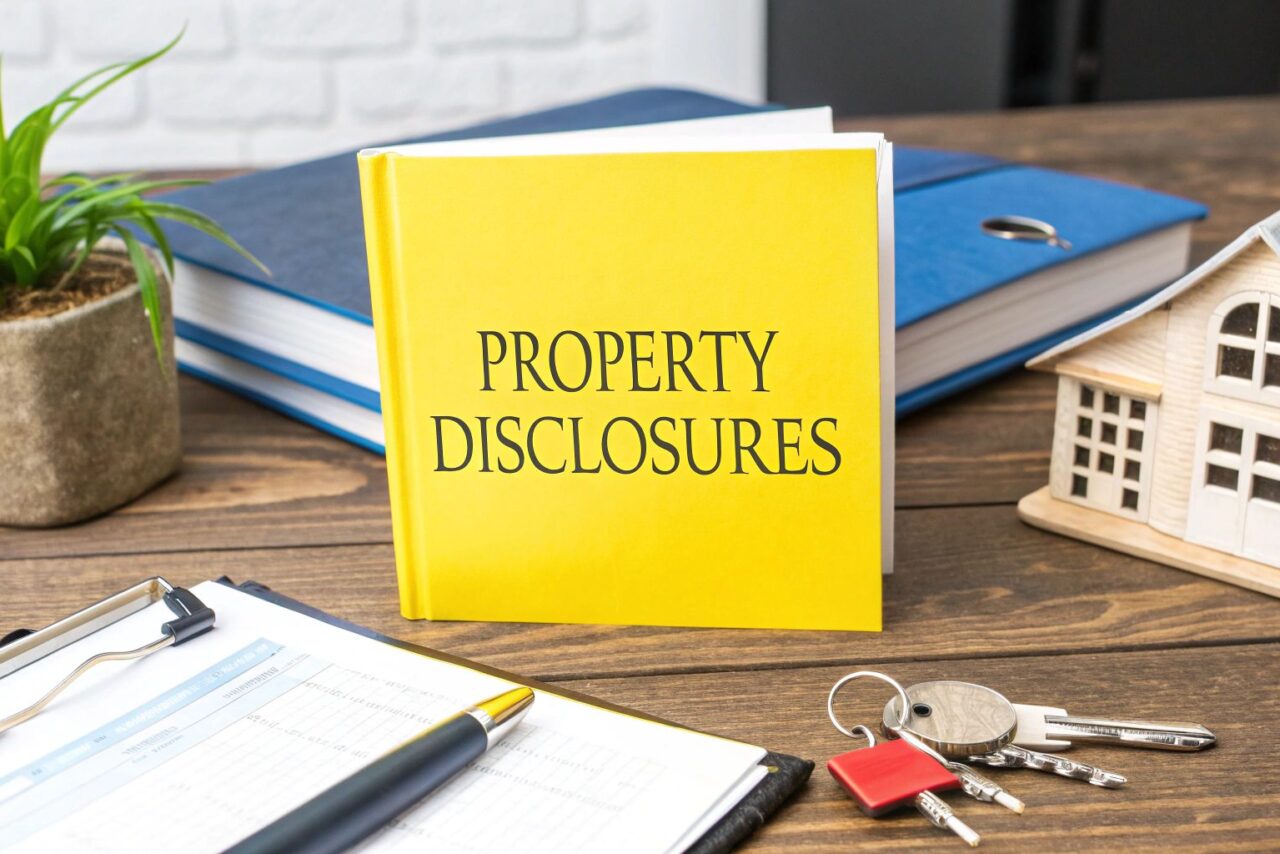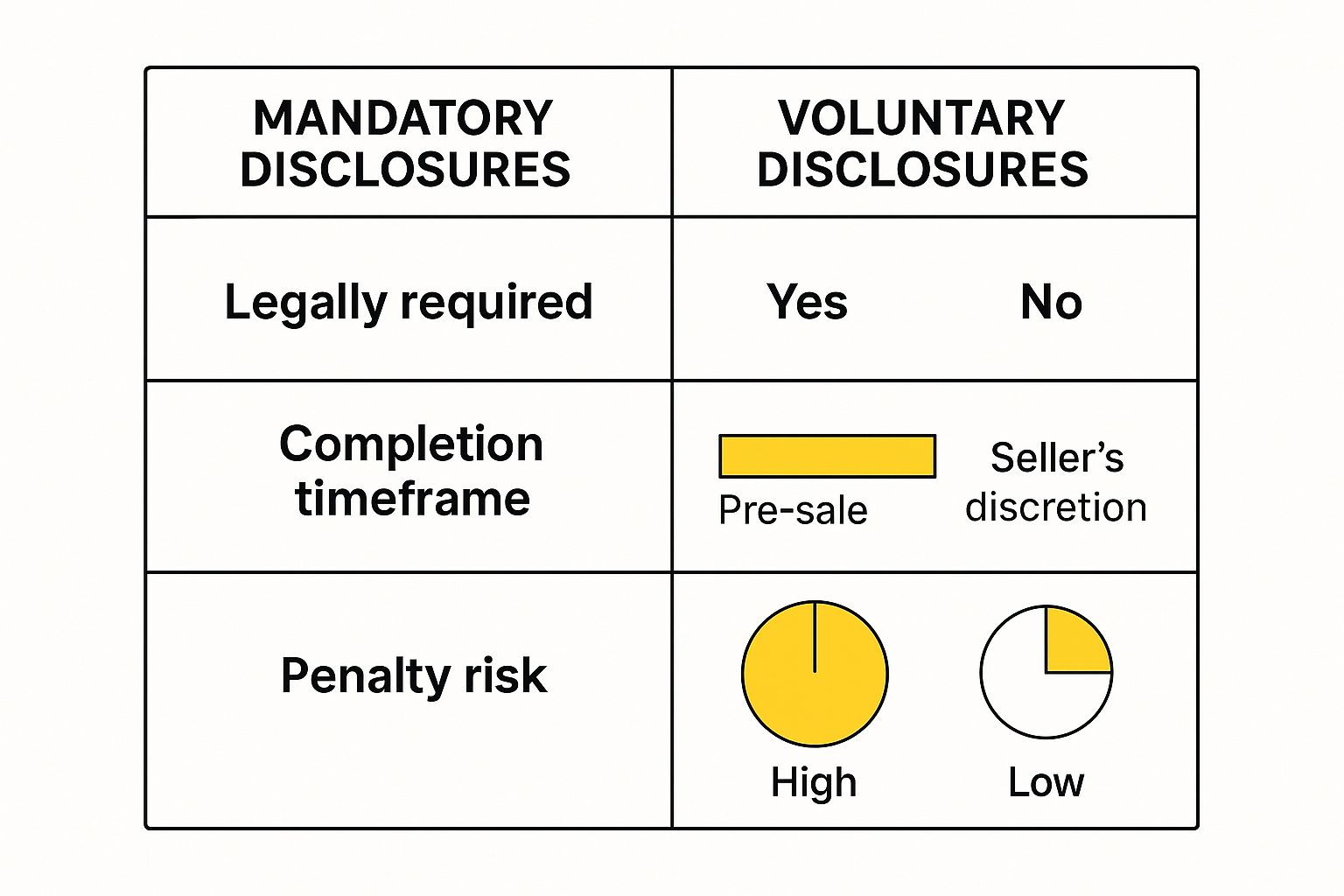
Selling your property is a massive milestone, but it also comes with some responsibilities. One of the biggest? Property disclosure. Thinking of selling? It’s natural to wonder, “what do I have to tell buyers?”
Before we start: The real estate content provided here is intended for general informational purposes only. It is sourced from various property news and information platforms, many of which offer valuable insights. However, we do not guarantee the accuracy, interpretation, or completeness of this material. Readers are strongly advised to undertake their own due diligence and seek independent legal advice before making any decisions based on this information.
So, what is disclosure? Simply put, it’s about being transparent with potential buyers about your property’s condition. This guide will demystify your obligations and show you why honesty is always the best policy for a smooth sale in Wellington’s dynamic market. With over 30 years of experience as a Licensed REINZ agent in Wellington, I’m here to help make this process clear and straightforward for you.
Your Guide to Seller Disclosure Obligations
When you decide to sell your home or apartment whether it’s a classic villa in Wadestown or a sleek apartment in Te Aro understanding the principles of disclosure is key. It’s a question I hear all the time: “What must you disclose?” The answer is all about fairness and transparency.
In New Zealand, our approach to property disclosure is shaped by common law and the Fair Trading Act 1986. This law prevents misleading or deceptive conduct in trade, which includes selling real estate. For sellers, this means you can’t intentionally hide known problems or give a potential buyer false information.

The Core Principles of Disclosure
Think of disclosure when selling property as building trust. Being upfront about your property’s history and condition doesn’t just cover your legal duties; it gives buyers the confidence to make a strong offer.
For you as the seller, it dramatically minimises the risk of messy disputes after the sale. This is especially true for unique Wellington properties, from hillside homes in Karori to seaside homes in Island Bay.
The key principles are straightforward:
- Honesty: Always give truthful answers to questions from buyers.
- Transparency: Don’t conceal significant issues that would likely affect a buyer’s decision or the price they’re willing to pay.
- Accuracy: Make sure every piece of information you provide is correct to the best of your knowledge.
Key Disclosure Principles for Wellington Sellers
| Principle | What It Means for You | Wellington Example |
|---|---|---|
| Honesty | Be truthful in all communications. Don’t downplay known issues or give vague answers when asked direct questions. | If a buyer asks about historical leaks in your Kelburn villa, you must tell them about the roof repairs you did five years ago. |
| Transparency | Proactively share important information that a typical buyer would want to know. Think “no surprises.” | The deck on your Khandallah home was built without council consent in 2009. |
| Accuracy | Ensure all details, documents, and statements are correct. Don’t guess or make assumptions about the property. | When stating the home’s square footage, use the official figures from council records, not a rough estimate. |
Navigating these rules can feel complex. As a Licensed REINZ agent with over 30 years of experience, my job is to help guide you through this process, making sure you meet your obligations for a smooth and successful sale.
What You Legally Must Disclose to Buyers
Working out exactly what you have to disclose can feel like navigating a maze. The guiding principle is simple: you need to share any known, significant information that could influence a buyer’s decision to purchase your property, or the price they’re willing to pay.
This isn’t about pointing out every minor scuff mark. It’s about being upfront with the stuff that really matters. The law breaks this down into two types of defects.
Patent Defects vs Latent Defects
Patent defects are obvious issues, like cracked windows or visible carpet stains, that a buyer would easily spot during a viewing. You are generally not required to point these out, as a buyer is expected to see them during their due diligence.
Latent defects are hidden problems not visible during a normal inspection. This is where your responsibility as a seller truly kicks in.
Examples of latent defects include:
- A persistent leak inside a wall that only shows after a heavy southerly.
- Foundation issues that have been covered up.
- Old wiring hidden behind the walls that poses a fire risk.
- The property being prone to flooding, which isn’t obvious on a sunny day.
Your responsibility is to disclose any latent defects you know about. Hiding something like this can be seen as misrepresentation and could lead to issues long after the sale.
Key Items You Must Disclose in Wellington
With our unique geography and mix of housing stock – from old character homes in Karori and Ngaio to newer builds in Johnsonville – some disclosures are especially important.
Unconsented Works
This is a big one across Wellington. Many homes, especially in suburbs like Brooklyn and Wadestown, have had additions over the years. If any work was done without proper building consent from the Wellington City Council, you must disclose it. This could be a converted garage, a new ensuite, or even a deck.
Weather-Tightness Issues
Any known issues with your property’s weather-tightness must be disclosed. This includes past leaks, current moisture problems, or any professional reports that flagged potential risks.
Earthquake-Prone Buildings
In Wellington, this is non-negotiable. When selling an apartment or a property in a multi-unit building, you must disclose its earthquake-prone building (EPB) status. For standalone houses, if you know of any structural weak points or have received engineering advice about its seismic performance, a buyer needs to know.
Boundary Disputes and Other Encumbrances
Are you in a dispute with a neighbour over a fence line in Vogeltown? Is there a tricky access agreement for a shared driveway in Highbury? Any ongoing disputes, known encroachments, or claims affecting the property title must be disclosed.
Navigating these requirements is much easier with a professional. As your local Ray White Licensed agent with over 30 years of experience, I help Wellington sellers understand exactly what to put on the table. This builds trust with buyers and protects you from headaches.
Understanding Unit Title Disclosure Rules
Selling a unit title property, like an apartment in Wellington Central or a townhouse in Johnsonville, involves specific disclosure rules under the Unit Titles Act. These rules ensure buyers get a clear picture of the Body Corporate they are joining.
As a seller, you must provide specific documents at key stages. Getting this wrong can cause delays or even allow the buyer to cancel the deal. It’s vital to get it right.
The Key Disclosure Statements
The process is built around two compulsory statements that reveal details about the unit and the complex. Having spent over 30 years in Wellington’s apartment market, I’ve seen how these documents build the buyer confidence needed to finalise a sale.
The statements are:
- Pre-Contract Disclosure Statement (PCDS): Your agent must give this to a potential buyer before they sign the sale and purchase agreement.
- Pre-Settlement Disclosure Statement (PSDS): This comes after the agreement is signed but before settlement day.
- Additional Disclosure Statement: This is optional and provided only if a buyer requests a deeper dive into the Body Corporate’s records.
For a clearer understanding of how different ownership types work, you can explore our simple guide on property title types in New Zealand.
Unit Title Disclosure Statements Explained
Here’s a quick breakdown of what each statement covers.
| Disclosure Type | When It’s Provided | Key Information Included |
|---|---|---|
| Pre-Contract Disclosure (PCDS) | Before the sale and purchase agreement is signed. | Your unit’s annual levy, upcoming maintenance plans, details of the long-term maintenance fund, and any pending legal action against the Body Corporate. |
| Pre-Settlement Disclosure (PSDS) | After the agreement is signed, but at least five working days before settlement. | Certifies the current levy amount, confirms if any levies are unpaid, and details any other outstanding costs owed to the Body Corporate. |
| Additional Disclosure | On request from the buyer after the agreement is signed. | A deep dive into the Body Corp’s financial records, meeting minutes, maintenance reports, and insurance details. |
What Goes into a Pre-Contract Disclosure Statement
The pre-contract disclosure statement is your first impression. It’s a summary that helps a buyer decide whether to make an offer.
This statement includes:
- The annual Body Corporate levy for your unit.
- Any planned maintenance for the next year.
- Whether the Body Corporate has a long-term maintenance fund.
- Details of any legal proceedings involving the Body Corporate.
- An explanation of what it means to own a unit title property.
This gives a buyer a quick financial snapshot and flags any big jobs on the horizon. While you as the owner are responsible for this, it’s something I always handle for my clients to ensure every detail is spot on.

The Pre-Settlement Disclosure Statement
Once the deal is signed, you need to provide the pre-settlement disclosure statement. Ask your solicitor about this. This must be delivered no later than the fifth working day before the settlement date. The Body Corporate manager usually prepares this, as it confirms the exact financial status of your unit right before handover. It ensures there are no financial surprises for the buyer on settlement day.
How Your Agent Manages the Disclosure Process
Navigating property disclosures is a critical part of selling, and it’s not something you should do alone. As a Ray White, Licensed agent, my role is to guide you through these duties.
With over 30 years of experience in Wellington’s property market, I’ve helped hundreds of sellers meet their obligations with confidence. It’s about helping and guiding you from future headaches and ensuring a smooth, transparent sale that builds trust with buyers.

Guiding You Through What to Disclose
One of the first things we’ll do is discuss your property’s history. We work together to identify any known issues upfront, from past repairs on a Karori bungalow to the details of a shared driveway in Berhampore. My job is to help you understand the difference between a minor flaw and a significant latent defect you are legally required to share.
Gathering the Essential Documents
A huge part of disclosure for sellers is getting the right paperwork in order. I’ll help you gather everything needed, such as:
- A Land Information Memorandum (LIM) report from Wellington City Council.
- The property’s Certificate of Title.
- Council property files with historical building consents.
- Invoices or warranties for major repair work.
Having this information ready shows you’re being transparent and makes the buyer’s due diligence process smoother.
Upholding Professional and Ethical Duties
As your local Ray White agent, I am bound by a strict code of conduct that legally requires me to disclose any known property defects to potential buyers. My duty is to act fairly and honestly. If I become aware of a significant issue with your home in Northland or your apartment in Te Aro, I have both an ethical and a legal obligation to disclose it. This is why choosing a top Wellington real estate agent like myself with decades of experience is so important it’s your safeguard for a correctly handled sale.
Preparing for a Transparent and Successful Sale
Getting your head around your disclosure obligations is a crucial first step. When you’re transparent, you build trust with buyers and set the stage for a smooth transaction. This process doesn’t have to be complex.

With years of experience in the Wellington market, from the classic character homes of Kelburn to the beautiful seaside spots in Island Bay, when you ask me to work for you I will guide you every step of the way. As your real estate agent, my job is to simplify the complex parts and ensure you meet all your legal requirements with confidence.
Your Partner in Property
Navigating property disclosures is simpler with a seasoned professional on your side. I help sellers across Wellington in suburbs like Karori, Khandallah, Brooklyn, and Newtown get their homes ready for a successful, stress-free sale.
My hands-on approach includes:
- A thorough chat to identify any disclosable information.
- Help gather all necessary documents.
- Clear, practical advice on presenting this information.
This preparation does more than just protect you; it strengthens your market position. Buyers feel more confident with a complete and honest picture of a property, especially when understanding ongoing costs. It’s always a good idea to be familiar with the typical costs associated with Wellington apartments to give buyers the full picture.
Thinking of Selling?
If you’re thinking about selling your Wellington home, let’s have a confidential chat. I can provide a free, no-obligation appraisal to give you a clear idea of your home’s value in today’s market.
If required, I have an extensive network of professional service people, from lawyers and builders to cleaners and gardeners, who can provide all the support you need for a seamless and successful sale.
Common Questions About Property Disclosures
It’s normal to have questions about the legal side of selling. Here are answers to some of the queries I hear most often from Wellington sellers.
What Happens If I Don’t Disclose a Known Issue?
Failing to disclose a known material defect can lead to legal and financial consequences. Under the Fair Trading Act, if it’s discovered that you knowingly hid a problem, the buyer can take action against you for misrepresentation, even after the sale. A court could order you to pay for repairs, damages, or, in worst-case scenarios, even cancel the sale. Full transparency is your best policy.
Should I Disclose Problems a Building Report Will Find Anyway?
Yes, absolutely. Your duty is not to actively hide or fail to mention known defects. Hoping an inspector finds a problem you already knew about can be seen as deceptive. Being proactive shows integrity and avoids the risk of a deal falling over late in the process, which erodes trust and can send buyers running.
Do I Have to Disclose Unconsented Renovations?
Without a doubt, yes. Disclosing any work done without council consent is crucial, especially in Wellington’s older suburbs like Karori, Newtown, or Thorndon. Not being upfront can create headaches for the new owner related to insurance, future renovations, or issues with the Wellington City Council, which could lead them back to you with a claim.
Is the Body Corporate Responsible for Apartment Disclosures?
While the Body Corporate manager provides the information for the disclosure statements, the legal responsibility to give them to the buyer sits with you and your agent, the seller. You must formally request the Pre-Contract and Pre-Settlement Disclosure Statements and ensure they are delivered within the required timeframes. With my extensive experience selling unit title properties across Wellington, from Pipitea to Oriental Bay, I handle this entire process for you, coordinating directly with the Body Corporate to ensure all legal requirements are met correctly.
Thinking of Selling? Let’s talk. I am committed to making your property sale as smooth and successful as possible. For a confidential discussion about your home and a free, no-obligation appraisal, please get in touch today.
https://wellingtonresidential.co.nz

.
.
.
.
.
.
.
.
.
.
.
.
.
.
.
.
Disclaimer: The real estate content shared on this blog is intended for general informational purposes only and industry observations. The content may reflect personal views or reference third-party sources, but it is not a substitute for tailored professional advice. Real estate decisions often involve legal, financial, and regulatory complexities, and readers should seek independent guidance from qualified specialists such as legal advisors, financial consultants, or compliance professionals before acting on any information presented here. No warranty is given as to the accuracy, completeness, or current relevance of the material.




